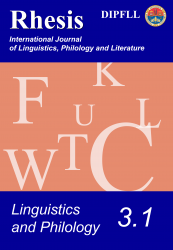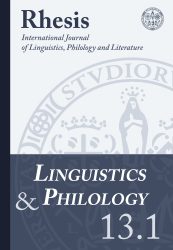 Linguistics and Philology
Linguistics and PhilologyVol. 3.1 - 2012
Download issue
Table of contents
| p. 5 | Historical Linguistics and Cognitive SciencePhilip Baldi, Paola Eulalia DussiasAbstract In this paper we investigate possible links between historical linguistics and cognitive science, or theory of the mind. Our primary goal is to demonstrate that historically documented processes of a certain type, i.e. those relating to semantic change and grammaticalization, form a unified theoretical bundle which gives insight into the cognitive processes at work in language organization and evolution. We reject the notion that historical phenomena are excluded from cognitive speculation on the grounds that they are untestable. Rather, we argue for an extension of Labov’s uniformitarian doctrine, which states “that the same mechanisms which operated to produce the large-scale changes of the past may be observed operating in the current changes taking place around us.” (Labov, 1972:161). This principle is transferable to the current context in the following way: first, language as a system is no different today than it was millennia ago, easily as far back as diachronic speculation is likely to take us; and second, the human brain is structurally no different today from the brain of humans of up to ten thousand years ago. The cognitivelinguistic parallelism between the past and the present makes speculation possible, in this case about codeswitching, even if it is not testable in the laboratory. It further allows us to make forward and backward inferences about both language change and its cognitive underpinnings
|
| p. 28 | Phraséologie et pragmatique dans la didactique de l'interprétation de liaisonFrancesca ChessaAbstract Pragmatics plays an important role in teaching liaison interpreting. During their learning process of the interpreter mediated interaction, students have to cope with problems related to the situational context, i.e. turn-taking management in conversational interaction, politeness, linguistic and cultural re-formulation of texts implying implicit sentences and non-literal expressions due to figurative registers of language. Phraseology is often a challenge for the interpreter who most of the times “translates language”, but doesn’t realise the “cultural envelope” of a sentence or discourse. Some examples are taken from students performances of a course of liaison interpreting with French and Italian as language combination, focusing on students’ strategies in dealing with different levels of meanings. Called to negotiate a text constructed step by step, the students are forced to challenge not only their linguistic competences but also their inferential skills, – starting from everyone’s encyclopaedic knowledge through the immediate perception of the context – to “grasp” the sense beyond the mere linguistic meaning of words.
|
| p. 36 | Non sappiamo come scriverlo, perciò non lo parliamo: mille e una scusa per un suicidio linguisticoMichele LoporcaroAbstract In this paper, I discuss the situation of Sardinian against the background of the massive on-going language extinction, which has long being recognized as a major problem for the world cultural heritage. In Sardinia (and, more generally, in Italy), though, this awareness is not as developed as elsewhere, so that language suicide (i.e. the choice by speakers not to pass over to next generations the original mother tongue of their own local community) is still associated with positive values such as ‘modernization’ and the like. After putting Sardinian in this perspective, I then argue that the introduction and consolidation of a shared written standard, as well as the teaching of Sardinian at school, should be conceived of primarily as measures to foster language maintenance, via the signalization that this language (like any language) is worth caring about, by speakers not less than by authorities. For these institutional efforts to be effective, consequently, a serious policy aimed at language revitalization is urgently needed, and this is where Sardinian authorities and institutions do not seem to have done their homework yet.
|
| p. 59 | Zu den Funktionen einiger Präpositionaladverbien (am Beispiel von darum, worum, dabei, wobei)Franca OrtuAbstract The treatment of German prepositional adverbs as described in German-language reference literature is not always exhaustive or unproblematic. Their functions are not limited to their syntactic and pro-form roles since they also realise rhetorical and pragmatic functions. These various uses in both spoken and written German are discussed in this paper, which is based on the study of corpora and, in some interesting and exceptional cases, on contrastive analysis. Focusing upon the four text operators described here, darum, worum, dabei and wobei, systemic grammaticalization and pragmaticalization processes are identified. Text analysis of prepositional adverbs and the study of their syntax should, on the one hand, contribute to recognizing their appropriate functions and, on the other hand, to developing and improving the ability of learners and speakers to use them.
|
Tags: causality, code-switching, cognitive science, concessivity, didactic on liaison interpreting, Franca Ortu, Francesca Chessa, grammaticalization, historical linguistics, language suicide, maintenance, Michele Loporcaro, Paola Eulalia Dussias, Philip Baldi, phraseology, polyfunctionality, pragmatics, pro-forms, revitalization, semantic change, shift, standardization, temporality
 Linguistics and PhilologyVol. 3.1 - 2012
Linguistics and PhilologyVol. 3.1 - 2012
